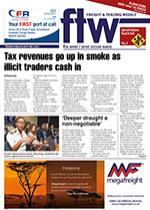Shippers and traders of legal cargoes of cigarettes and tobacco are likely to come under increasing scrutiny and be subjected to delays as the South African Revenue Service (Sars) tries to ensure that government receives the taxes due. In February finance minister Tito Mboweni raised the excise duty on a pack of 20 cigarettes by R1.14 to R16.66, and that
of a typical cigar by 64c to R7.80. But the global experience is that increases in tobacco tax lead to increased smuggling and non-compliance by manufacturers – and therefore reduced revenues to government. This is due to a simple business decision – return versus risk. In South Africa, thanks to the closure by Sars in 2014 of project “Honey Badger” –
which investigated the illicit tobacco trade – and steadily rising cigarette taxes, there has been little risk and very high reward. So much so that the illegal cigarettes costing as little as R5 per pack are openly on sale in more than 100 000 shops across the country, according to an Ipsos study published in 2018. Manufacturers of cigarettes selling below the minimum tax level are expanding their distribution
networks at the same time as Sars has announced plans to crack down on the illegal trade. There is big money at play. Ipsos found that over 33% of cigarettes sold through informal shops (or almost 80% of all tobacco sales) were priced well below what was then minimum tax payable of R17.85 – consisting of excise duty and VAT. That means, according to the Tobacco Institute of South Africa (Tisa), the illegal industry bleeds the country of some R7 billion in taxes a year – or around 3% of the budget deficit. FTW has been told by shippers and security experts in Zambia and Zimbabwe that the illegal cigarette business in South Africa has become so sophisticated that blenders operating out of “pop-up” mobile factories personally select the trucks to be hijacked. The intelligence of the blenders is so good that they can identify individual trucks and loads. As a result, shippers are rerouting cargo through other ports in the region. In reaction to the cigarette tax hike, Ntando Sibisi, chairperson of the Black Tobacco Farmers’ Association (BTFA), said the decision amounted to “callous disregard” for law-abiding workers at a time when government was failing to enforce the law. Sibisi said 10 000 jobs in the legal sector were at risk due to the rapidly rising market share of illegal cigarettes. While BTFA welcomed the decision to establish an illicit trade economy unit, members “have heard all that before”. Christo van Staden, managing director of Limpopo Tobacco Processors, said “the increase in excise duties makes things difficult as we are now in limbo. Our last hope is Sars whose job has not been made any easier today.” He is right. According to researchers from the Mackinac Center for Public Policy in the United States, nearly 56% of all cigarettes consumed in New York State are smuggled. “It is not hard to see why. The state’s excise tax of $4.35 per pack is tied for the highest in the nation and New York City piles on an additional $1.50 tax,” they state. There are similar
studies from around the world, including Australia where it is estimated that 15% of cigarettes are illegal. “There is no denying the link between high excise and the illicit market. As excise on tobacco contributes to increased prices, the attractiveness of the illicit market becomes even more obvious to serious and organised crime,” said Rachel Elliott from Imperial Tobacco, which commissioned the report with Phillip Morris. Sars has further challenges – according to the World Bank the level of tobacco smuggling tends to rise in line with the degree of corruption in a country.
Tax revenues go up in smoke as illicit traders cash in
08 Mar 2019 - by Ed Richardson
0 Comments
FTW 8 March 2019

08 Mar 2019
08 Mar 2019
08 Mar 2019
08 Mar 2019
08 Mar 2019
08 Mar 2019
Border Beat
Featured Jobs
New
New
